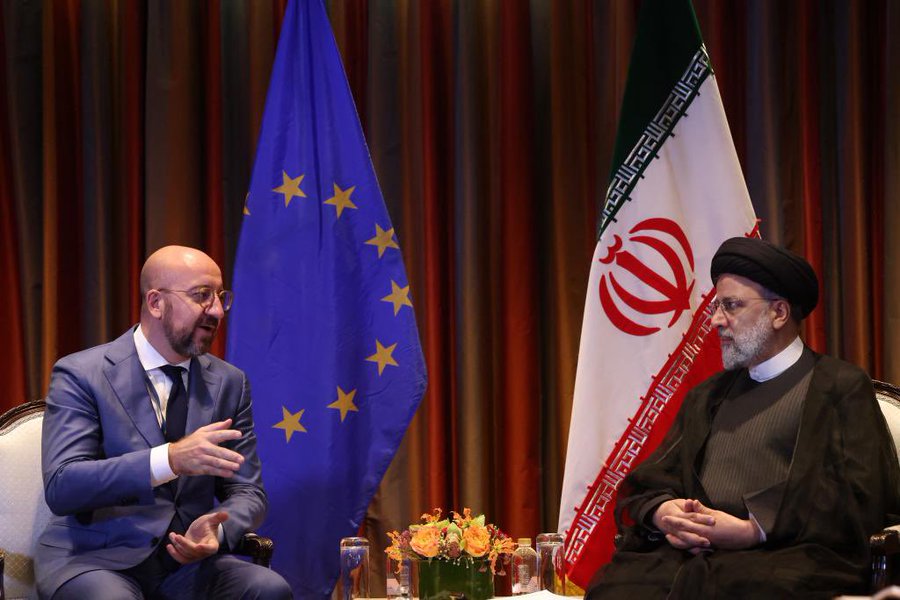In most EU member states denying the Holocaust is punishable following a Council decision on combatting racism and xenophobia but in Iran the president himself is not sure that the Holocaust has happened.
Iran is currently negotiating with the US and the other signatories - with EU’s foreign policy chief, High Representative Josep Borrell as coordinator - about a return to the nuclear deal (JCPoA), from which the US withdrew unilaterally in 2018. As previously reported, Borrell presented in August a final compromise proposal for a return to the full delivery of the JCPoA.
This did not prevent the Iranian president, Ebrahim Raisi, to question the Holocaust in a CBS interview on Sunday. Asked if he believed that the Holocaust had happened and that 6 million Jews had been killed, he replied: "Historical events should be investigated by researchers and historians. There are some signs that it happened. If so, they should allow it to be investigated and researched."
The EU is still waiting for a positive outcome of the nuclear talks and did not react immediately to Raisi’s statement. World leaders, including EU leaders and Iran’s pressident, have travelled to New York for the United Nations General Assembly this week. Bilateral talks on the margins of the assembly have already been held by European Council President Charles Michel and the Iranian President.
Michel twitted after his talks with Raisi that, “EU is fully behind an immediate restoration of #JCPOA Concluding an agreement soon is in our shared interest. Also discussed regional and bilateral issues as well as human rights notably rights of women.” No mentioning of Raisi’s Holocaust remarks.
No breakthrough expected
According to press remarks by Josep Borrell after an informal EU foreign affairs meeting in New York, he does not expect any breakthrough in the nuclear talks this week.
“Until the middle of August, the process was converging. And after, the parties made some proposals that were certainly not contributing to look for a final result. But in the last days, nothing has happened and I do not expect that anything will happen during this week.”
“There is a proposal on the table, and this proposal will remain on the table. I do not see a better solution than the one that we have proposed, and it is not something that is going to become obsolete.”
Raisi’s remarks do not add to Iran’s credibility. The Brussels Times asked at the Commission’s press conference in Brussels on Tuesday whether president Raisi’s remarks could have a negative impact on the prospects of reaching an agreement. Peter Stano, EU’s lead spokesperson for foreign affairs, replied that it is up to the parties concerned to decide if the proposal is acceptable to them or not.
“There have been two rounds of remarks, mainly from the Iranian and US parties, after which it was obvious that their positions were diverging instead of converging. Now all efforts are done by the coordinator (Borrell) to find consensus on the proposal. As he has said, there will be no other proposal on the table.”
EU appalled by remarks
On the issue of Raisi’s Holocaust remarks, he said that the EU was of course appalled by the president’s remarks. “We are committed to combat antisemitism and any attempt to condone, deny, justify or trivialize the Holocaust. This is EU’s very strong position. Denying the Holocaust is an insult to the millions of people who died a tragic and inhuman death in the Holocaust.”
“Let me make one thing absolutely clear,” underlined Eric Mamer, chief spokesperson of the European Commission: “The Holocaust is a historical fact, it’s proven, it’s documented. There can be absolutely no doubt that these terrible events took place and cast a terrible shadow on the history of not only Europe but the whole world.”
Another issue which is indirectly linked to the nuclear talks and Iran’s credibility is the growing cooperation between Iran and Russia. The latter is both a party to the JCPoA and responsible for the war in Ukraine.
Is EU worried about the cooperation between Iran and Russia in circumventing the EU sanctions and the use of Iranian drones by Russia in the war against Ukraine?
“We call on our partners to align themselves with our sanctions against Russia or to take similar national measures,” Peter Stano, the foreign affairs spokesperson, replied. “At least, they must do their utmost not to circumvent the sanctions.”
“This is the message we are conveying to our partners, to Iran, Turkey and other countries,” he added. “We are watching very carefully how they are acting. The war is not only an attack against Ukraine but on the international rule-based order to which all countries have signed up to. By helping Russia to circumvent the sanctions, they are supporting its illegal, unjustified and terrible war.”
M. Apelblat
The Brussels Times

